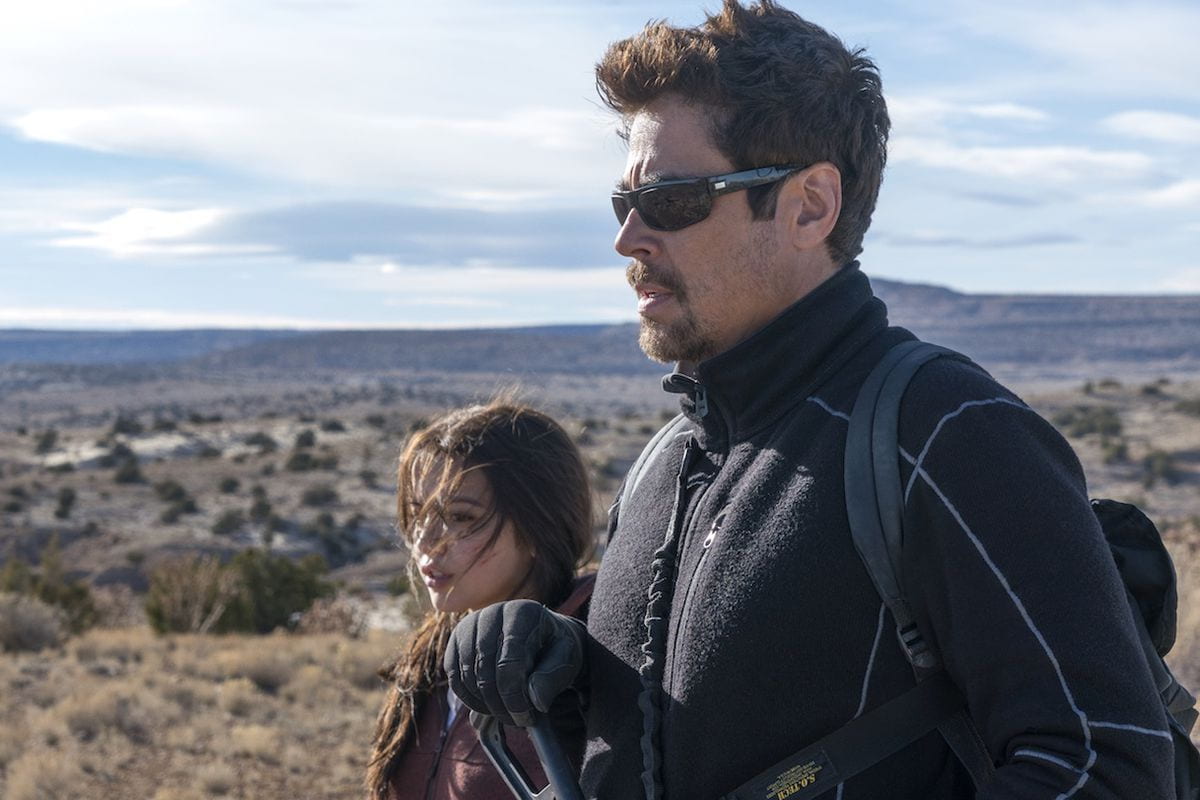Sometimes films are made to commentate an existing social issue. Others times they are made in reaction to an event. And sometimes films are lucky enough to have their release and subject matter line up with the current news cycle. Sicario: Day of the Soldado is that film. From the opening scene, the film doesn’t hold back on its subject matter as you are set up for a dark and intriguing look at border policy and illegal immigration, but it is unfortunate that a film which directly hits on the issues being debated in real time can’t make anything of itself. Instead, we get a film whose script is par for the course and whose direction does little in the way of elevating the narrative to anything more than a film that lives in the shadow of its predecessor.
Following one of the best films of 2015, Sicario: Day of the Soldado starts with the Mexican drug cartel smuggling terrorists over United States border. Tasked with solving this problem is returning FBI agent Matt Graver (Josh Brolin) who is given clearance to solve the problem by any means, even if that means breaking federal law. To do so, he enlists Alejandro Gillick (Benicio del Toro) to help concoct a war between rival cartels with the hopes that infighting disrupts operations. Operating in secrecy, the agency decides that kidnapping Isabel Reyes — the daughter of a cartel leader played by Isabela Moner — will stir the pot, but things get FUBAR-ed and soon find themselves questioning their motives as the US government tries to hide all traces.

“Day of the Soldado” is also one of the more topically relevant films to come to mind in recent years. Where films like The Post were made in a reaction to current events, this film is relevant because the news cycle happened to coincide with its release. As mentioned before, the film’s premise is about cartels sneaking terrorists across the border, and if you’ve been online for the last three weeks, you know how caustic immigration policy is right now. Scenes of crossing immigrants being used as a front for contraband is sure way to validate and embolden certain federal policies, but it is important to note though that the film is not taking sides. The first film in the series is about the moral boundaries that are broken to achieve an individuals own sense of justice, and in this film, it is the US government’s willingness, and subsequent regret, to get ‘dirty’ in order to achieve a goal that is put under a microscope. The film even makes heavy handed allusions to the US government being its own form of terrorism when they literally define the word ‘terrorism’, clueing audiences in to what the theme of the film will be. Admittedly though, the coincidence of news and theme did make for a more meta experience and a great deal of critical thinking about the film’s construction and approach to such delicate subject matter.
That being said, the script one of Sheridan’s weaker scripts (if not the weakest). While his work on Hell or High Water, Sicario, and Wind River are considered some of the best neowesterns this decade, “Day of the Soldado” is undeniably a step down from pervious works. This outing decides to unhinge itself from a single perspective and focus on Graver’s and Gillick’s willingness to participate in dismantling cartels. The film’s predecessor benefited by locking itself to Emily Blunt’s character perspective, but with this there is an unnatural diffusion of focus. By that, the film chooses to not align itself with anyone and you get the sense that you are just watching events play out. The lack of a moral anchor would aide in navigating this inhospitable world, and while the characters are brought around by the inclusion of Isabel, the script lacks any degree of character dictation, letting the audience’s own moralities navigate the vague and unclear ones set forth. Sheridan is undoubtably a man of the modern western, but this outing doesn’t show it.
The neutral script is not aided by the poor directing either. To a certain extent, Sheridan’s prior scripted works could lend much of their success to their directors. Sicario in particular is a primary example of this as Denis Villeneuve took Sheridan’s script and directed the hell out of it, making it a case study in direction and establishing Villeneuve as one of the most talented Hollywood directors working right now. This film has little to compare to the original as Stefano Sollima (a prominent television director) takes the helm with the sequel. Moments of tension that made the original so memorable are all but lost in the sequel as stunted action displaces suspenseful set pieces. Notably, two sequences in this film that try to replicate the infamous border crossing scene in the original, and neither come close to the direction and skill on display in the first. This shortfall envelops the entire film and nearly every scene has a sense of improvement that can be made with better editing or shot selection. Sollima’s sensibilities are just not the same as Villeneuve’s, and while that is not inherently a bad thing, it makes for a more amateurish outing than the first.
Score: 2.5/5 Stars
